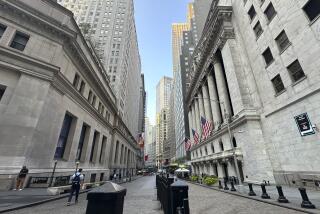Business Indicators Rise a Hefty 0.7%; Analysts Skeptical
WASHINGTON — The government’s main gauge of future economic activity rose a solid 0.7% in August, giving further evidence that the economy is at long last rebounding from a yearlong slump.
However, a survey of national business economists released today showed less optimism, with more than half the analysts predicting a recession before next year is over.
The Commerce Department said today that the advance in its index of leading indicators matched a revised 0.7% in July. Both months showed the strongest gains since a 0.8% February advance.
The July gain had originally been reported as a much weaker 0.4% increase.
Many analysts believe the index is correctly forecasting that the economy will show growing strength in coming months.
Opposing Forecast
But in another assessment of the economic future, the National Assn. of Business Economists predicted today that the economy will grow an anemic 2.2% this year, rebounding only slightly to 2.7% growth in 1986.
In an even more ominous assessment, the association said 52% of the 350 economists who responded to its latest survey believed the country will be in a recession by the end of 1986.
Kathleen Cooper, vice president of the association, said the majority of economists felt that the federal government’s huge budget deficits will derail the current recovery in the next 15 months.
The Reagan Administration has forecast that the economy will rebound sharply in the second half of the year, rousing itself from a prolonged period in which a soaring trade deficit severely depressed activity in the U.S. industrial sector.
Unemployment Drops
To support that view, Administration economists pointed to a variety of statistics that showed strength in August.
Unemployment, stuck at the same level for six months, dropped to 7% in August while consumer spending, housing construction and industrial production all posted solid gains.
However, the broadest measure of economic health, the gross national product, was advancing at a modest 2.8% rate in the July-September quarter, the government has estimated.
While a substantial improvement over the anemic 1.1% annual rate turned in during the first six months of the year, the GNP’s pace in this quarter is far below the 5% growth rate forecast by the Administration.
11 Indicators Checked
The August advance for the leading indicators was powered by positive contributions from six of the 11 available indicators.
The biggest contribution came from an increase in the money supply, followed by gains in building permits, the length of the average workweek, the number of new businesses, new orders for consumer goods and a dip in the number of weekly unemployment claims.
Four indicators held the index back. The biggest negative came from a drop in stock prices followed by negative changes in the length of time it took to get deliveries of business orders, changes in sensitive material prices and in the amount of outstanding debt.
One indicator, contracts for capital equipment, was unchanged from the July level.
More to Read
Inside the business of entertainment
The Wide Shot brings you news, analysis and insights on everything from streaming wars to production — and what it all means for the future.
You may occasionally receive promotional content from the Los Angeles Times.










